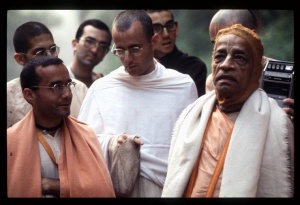SB 4.24.3: Difference between revisions
m (1 revision(s)) |
(Vanibot #0018 edit: make synonym terms in Sanskrit italic in SB - Vanisource) |
||
| Line 1: | Line 1: | ||
{{info | {{info | ||
|speaker= | |speaker=Maitreya Ṛṣi | ||
|listener= | |listener=Vidura | ||
}} | }} | ||
[[Category:Srimad-Bhagavatam - Canto 04 Chapter 24|s03 ]] | |||
[[Category:Bhagavatam Verses Spoken by Maitreya Rsi - Vanisource|042403]] | |||
<div style="float:left">'''[[Srimad-Bhagavatam]] - [[SB 4|Fourth Canto]] - [[SB 4.24: Chanting the Song Sung by Lord Siva|Chapter 24: Chanting the Song Sung by Lord Śiva]]'''</div> | |||
<div style="float:right">[[File:Go-previous.png|link=SB 4.24.2]] '''[[SB 4.24.2]] - [[SB 4.24.4]]''' [[File:Go-next.png|link=SB 4.24.4]]</div> | |||
{{RandomImage}} | |||
==== TEXT 3 ==== | ==== TEXT 3 ==== | ||
<div | <div class="verse"> | ||
antardhāna-gatiṁ śakrāl | :antardhāna-gatiṁ śakrāl | ||
labdhvāntardhāna-saṁjñitaḥ | :labdhvāntardhāna-saṁjñitaḥ | ||
apatya-trayam ādhatta | :apatya-trayam ādhatta | ||
śikhaṇḍinyāṁ susammatam | :śikhaṇḍinyāṁ susammatam | ||
</div> | </div> | ||
| Line 16: | Line 22: | ||
==== SYNONYMS ==== | ==== SYNONYMS ==== | ||
<div | <div class="synonyms"> | ||
''antardhāna''—of disappearance; ''gatim''—achievement; ''śakrāt''—from King Indra; ''labdhvā''—getting; ''antardhāna''—of the name; ''saṁjñitaḥ''—so nominated; ''apatya''—children; ''trayam''—three; ''ādhatta''—begot; ''śikhaṇḍinyām''—in Śikhaṇḍinī, his wife; ''su-sammatam''—approved by everyone. | |||
</div> | </div> | ||
| Line 23: | Line 29: | ||
==== TRANSLATION ==== | ==== TRANSLATION ==== | ||
<div | <div class="translation"> | ||
Formerly, Mahārāja Vijitāśva pleased the King of heaven, Indra, and from him received the title Antardhāna. His wife's name was Śikhaṇḍinī, and by her he begot three good sons. | Formerly, Mahārāja Vijitāśva pleased the King of heaven, Indra, and from him received the title Antardhāna. His wife's name was Śikhaṇḍinī, and by her he begot three good sons. | ||
</div> | </div> | ||
| Line 30: | Line 36: | ||
==== PURPORT ==== | ==== PURPORT ==== | ||
<div | <div class="purport"> | ||
Mahārāja Vijitāśva was known as Antardhāna, which means "disappearance." He received this title from Indra, and it refers to the time when Indra stole Mahārāja Pṛthu's horse from the sacrificial arena. Indra was not visible to others when he was stealing the horse, but Mahārāja Pṛthu's son Vijitāśva could see him. Yet despite his knowing that Indra was taking away his father's horse, Vijitāśva did not attack him. This indicates that Mahārāja Vijitāśva respected the right persons. Although Indra was stealing the horse from his father, Vijitāśva knew perfectly well that Indra was not an ordinary thief. Since Indra was a great and powerful demigod and servant of the Supreme Personality of Godhead, Vijitāśva purposefully excused him due to sentiment only, even though Indra was acting wrongly. Thus Indra became very pleased with Vijitāśva at that time. The demigods have the great mystic power of being able to appear and disappear according to their will, and since Indra was very pleased with Vijitāśva, he bestowed this mystic power upon him. Thus Vijitāśva became known as Antardhāna. | Mahārāja Vijitāśva was known as Antardhāna, which means "disappearance." He received this title from Indra, and it refers to the time when Indra stole Mahārāja Pṛthu's horse from the sacrificial arena. Indra was not visible to others when he was stealing the horse, but Mahārāja Pṛthu's son Vijitāśva could see him. Yet despite his knowing that Indra was taking away his father's horse, Vijitāśva did not attack him. This indicates that Mahārāja Vijitāśva respected the right persons. Although Indra was stealing the horse from his father, Vijitāśva knew perfectly well that Indra was not an ordinary thief. Since Indra was a great and powerful demigod and servant of the Supreme Personality of Godhead, Vijitāśva purposefully excused him due to sentiment only, even though Indra was acting wrongly. Thus Indra became very pleased with Vijitāśva at that time. The demigods have the great mystic power of being able to appear and disappear according to their will, and since Indra was very pleased with Vijitāśva, he bestowed this mystic power upon him. Thus Vijitāśva became known as Antardhāna. | ||
</div> | </div> | ||
__NOTOC__ | |||
<div style="float:right; clear:both;">[[File:Go-previous.png|link=SB 4.24.2]] '''[[SB 4.24.2]] - [[SB 4.24.4]]''' [[File:Go-next.png|link=SB 4.24.4]]</div> | |||
__NOTOC__ | |||
__NOEDITSECTION__ | |||
Revision as of 23:12, 30 November 2017

A.C. Bhaktivedanta Swami Prabhupada
TEXT 3
- antardhāna-gatiṁ śakrāl
- labdhvāntardhāna-saṁjñitaḥ
- apatya-trayam ādhatta
- śikhaṇḍinyāṁ susammatam
SYNONYMS
antardhāna—of disappearance; gatim—achievement; śakrāt—from King Indra; labdhvā—getting; antardhāna—of the name; saṁjñitaḥ—so nominated; apatya—children; trayam—three; ādhatta—begot; śikhaṇḍinyām—in Śikhaṇḍinī, his wife; su-sammatam—approved by everyone.
TRANSLATION
Formerly, Mahārāja Vijitāśva pleased the King of heaven, Indra, and from him received the title Antardhāna. His wife's name was Śikhaṇḍinī, and by her he begot three good sons.
PURPORT
Mahārāja Vijitāśva was known as Antardhāna, which means "disappearance." He received this title from Indra, and it refers to the time when Indra stole Mahārāja Pṛthu's horse from the sacrificial arena. Indra was not visible to others when he was stealing the horse, but Mahārāja Pṛthu's son Vijitāśva could see him. Yet despite his knowing that Indra was taking away his father's horse, Vijitāśva did not attack him. This indicates that Mahārāja Vijitāśva respected the right persons. Although Indra was stealing the horse from his father, Vijitāśva knew perfectly well that Indra was not an ordinary thief. Since Indra was a great and powerful demigod and servant of the Supreme Personality of Godhead, Vijitāśva purposefully excused him due to sentiment only, even though Indra was acting wrongly. Thus Indra became very pleased with Vijitāśva at that time. The demigods have the great mystic power of being able to appear and disappear according to their will, and since Indra was very pleased with Vijitāśva, he bestowed this mystic power upon him. Thus Vijitāśva became known as Antardhāna.